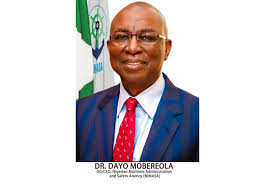The Nigerian Maritime Administration and Safety Agency (NIMASA) has proposed the adoption of Public- Private Partnership (PPP) model to attract more investments required to boost the country’s maritime infrastructure, and by implication improve the sector’s contribution to the nation’s Gross Domestic Product (GDP).
The Director-General of the agency, Dr. Dayo Mobereola, who advocated the need for improved investments in the maritime industry, when the Director-General of the Infrastructure Concession Regulatory Commission (ICRC), Dr. Jobson Ewalefoh, paid a working visit to his office, stressed the importance of the Commission’s involvement in attracting private investors to develop the infrastructure in the key sector of the economy.
The NIMASA boss said: “We appreciate the management of the ICRC for being responsive. However, you know that the maritime sector is capital intensive and government funds cannot solely put in place the required infrastructure. We need the ICRC to develop PPP- based business models that will be attractive to the private sector both from within and outside the country.
“There is the need to streamline processes by the use of technology, as we will continue to count on the support of ICRC to help drive the Agency’s PPP projects for effective and efficient service delivery to our stakeholders”, Mobereola added.
In his remarks, Ewalefoh, who agreed with the NIMASA Director-General’s position, underscored the significance of the maritime sector to Nigeria’s economy.
According to him, the PPP model would facilitate increased funding and expertise from the private sector, thereby accelerating the growth and development of the Nigerian maritime sector
The ICRC chief assured that the commission was fully ready to partner the agency on its projects and ensure timely execution.
He said: “There is no time to waste; our country needs lots of funding for infrastructure and we need to create an enabling environment for activities to thrive. First is service delivery, not revenue generation, and people will be willing to pay if they get the right services.”






